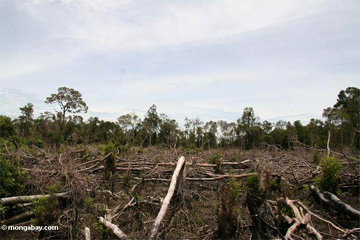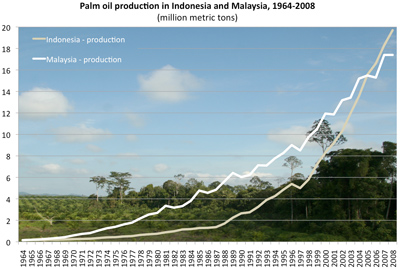Unilever has told Indonesian suppliers to stop sourcing palm oil from Duta Palma due to concerns over deforestation, reports Reuters.
Unilever’s warning comes shortly after a BBC documentary linked palm oil used in the company’s products to rainforest destruction by Duta Palma.
Derom Bangun, vice-chairman of the Indonesian Palm Oil Board, an industry body, told Reuters Unilever’s decision was a direct result of the documentary.
“It is Unilever’s decision,” Bangun told Reuters. “Unilever did not have a supply contract with Duta Palma to begin with. They are safeguarding their supply mechanisms by asking their traders not to buy palm oil from this company after that BBC report.”
 Peat forest conversion for an oil palm plantation in Kalimantan, Indonesian Borneo. |
The move comes two months after Unilever, the world’s largest corporate palm oil buyer, dropped a $32.6 million contact with PT Smart, a subsidiary of Sinar Mas, Indonesia’s largest palm oil producer, due to the company’s poor environmental record. Sinar Mas has seen an exodus of major Western buyers in recent weeks.
The latest move by Unilever adds pressure on the Roundtable on Sustainable Palm Oil (RSPO), a budding certification scheme that aims to encourage environmental stewardship among palm oil producers. RSPO is seen by many as a path forward towards more responsible palm oil production, but the initiative has been criticized by environmentalists for weak monitoring and compliance protocols. The Duta Palma incident adds fuels to the fire since the company is a member of RSPO.
“It creates a lot of suspicion between the two groups,” an RSPO official in Malaysia told Reuters.
“But it highlights the difficulty of trying to stay green, especially when the Indonesian government is handing out concessions to develop oil palms.”
Oil palm agriculture
 |
As the world’s oil palm is the highest-yielding commercial oilseed, palm oil production offers more vegetable oil per unit of area than other widely-grown crops including soy, canola, or rapeseed. Thus oil palm expansion on abandoned agricultural lands could offer producers a more effective way to sustainably meet growing demand for vegetable oils than with other oilseeds.
Environmentalists are most concerned by palm oil production that comes at the cost of carbon-dense and biologically-rich rainforests and peatlands. Since 1990 more than half of plantation growth has occurred at the expense of natural forests, boosting greenhouse gas emissions and increasing the vulnerability of endangered species like orangutans, Sumtran rhinos, pygmy elephants, and Sumatran tigers to extinction in the wild. Plantations have also been strongly associated with social conflict in some areas.
Related articles
UK to fund efforts to shift towards greener palm oil production
(01/31/2010) Britain will contribute £50m ($80m) towards efforts to reduce greenhouse gas emissions in Indonesia, including a project that aims to encourage palm oil producers to establish plantations on degraded lands instead of in place of rainforests and carbon-dense peatlands, reports BBC News.
Consumers should help pay the bill for ‘greener’ palm oil

(01/12/2010) Palm oil is one of the world’s most traded and versatile agricultural commodities. It can be used as edible vegetable oil, industrial lubricant, raw material in cosmetic and skincare products and feedstock for biofuel production. Growing global demand for palm oil and the ensuing cropland expansion has been blamed for a wide range of environmental ills, including tropical deforestation, peatland degradation, biodiversity loss and CO2 emissions. In response to these concerns, a group of stakeholders—including activists, investors, producers and retailers—formed the Roundtable on Sustainable Palm Oil (RSPO) to develop a certification scheme for palm oil produced through environmentally- and socially-responsible ways. It is widely anticipated that the creation of a premium market for RSPO-certified sustainable palm oil (CSPO) would incentivize palm oil producers to improve their management practices.
Forest destruction by Sinar Mas undermines efforts to develop and promote greener palm oil
(12/14/2009) An investigation commissioned by Unilever, the world’s largest buyer of palm oil, confirms that Indonesian group Sinar Mas, the world’s second largest producer of palm oil, has been destroying forests and peatlands despite committing to “greener” palm oil production as a member of the Roundtable on Sustainable Palm Oil (RSPO). Unilever has now suspended its $32.6 million contract with Sinar Mas.